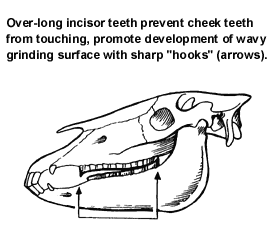|
|
WHAT HAPPENS IN YOUR BARN AND WHY YOU NEED
EQUINE DENTISTRY
Your horse lives under conditions quite
different from those found in the wild. Three artificial conditions which
impact your horse's mouth most are:
- He lives inside of a fenced area.
- Most of his diet is made up of processed
feeds (grain and hay).
- He is not able to graze outside twelve
hours or more per day.
Radio-tracking studies of mustangs show that
the animals travel an average of thirty to forty miles per day
throughout the year. They do this as a natural consequence of their search
for food and water. The impact of fences (confinement) on domestic horses has
often been documented -- for example, on stress levels, on the condition of
their feet and legs, and on parasite loads. Fences enclosing groups of horses
often create "dry lot" conditions under which there is little or no
plant material available to graze. This makes feeding hay and grain
necessary.
How does this impact your horse's teeth?
Although processed feeds still give your horse's cheek grinders a workout, he
does not nip these foods before bringing them into his mouth.
- Over time, this results in failutre of the
horse's incisors to keep pace in wear with the cheek teeth. The incisors
become so long that they partially or totally prevent the cheek teeth from
touching. This in turn makes it impossible for your horse to chew his food
properly. And that, in turn, can be some really horrific consequences,
including:

- Temporo-mandibular (TM or jaw joint) pain,
causing horse to be difficult or unsteady on the bit.
- Various forms of "snaggletoothed"
or "wavy" mouth, causing uneven chewing pressure and the development
of sharp "hooks" at the fore and aft ends of the cheek tooth
batteries. "Hooks" can eventually become so long that they gouge the
gum above or below, creating abscesses and pain which can in turn cause the
horse to stiffen its neck or cock its head when ridden or driven.
- Sharp "points" on the inner and
outer edges of the cheek teeth. Points cause cheek and tongue abrasions, and
again the tendency to fight the bit.
- Failure to properly grind food, resulting
in significant waste of food, and more seriously, in increases in the frequency
of colic. (In order for horses to absorb water and nutrients in the gut, a
"mush" of chopped grass blades must be continually present there, not
long unchewed stems balled up like twine).
 |
 |
The
information and illustrations in this section are kindly provided by the
Canadian Equine Dental Consultants and the American Equine Dental Consultants.
For further information please visit their website -
click here
|
 |
Canadian Equine
Dental Consultants
American Equine Dental Consultants
Email:
cedc@telusplanet.net
Website:
www.equinedental.com |
 |
|
|

